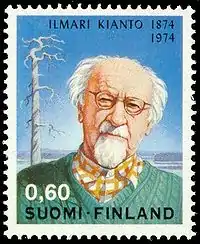Ilmari Kianto
Ilmari Kianto (7 May 1874 – 27 April 1970), also known as Ilmari Calamnius and Ilmari Iki-Kianto, was a Finnish author. He was born in Pulkkila, Northern Ostrobothnia, and is best known for his books Punainen viiva ("The Red Line", published 1909)[1] and Ryysyrannan Jooseppi (published in 1924). In his books, he describes people and living at Suomussalmi municipality in Kainuu region.[2] He died in Helsinki, aged 95. Composer Jean Sibelius used Kianto's poem 'Lastu lainehilla' (Driftwood) as the lyric for the last of his Seven Songs, Op.17 (1902).

Kianto's books have also been adapted into films, most notably the 1955 film Joseph of Ryysyranta directed by Roland af Hällström[3] and the 1959 film The Red Line directed by Matti Kassila.[4] In the year 1978 composer Aulis Sallinen made a libretto based on Kianto´s novel and composed an opera The Red Line.
References
- David Arter Scandinavian politics today 2013 - 1847794939 "Hence at elections voters simply drew a red line under the candidate of their choice. Red Line (Punainen viiva) is the title of a novel by Ilmari Kianto, first published in 1909, in which the writer portrays the way social democracy became the new"
- Korpikirjailija Ilmari Kianto – Yle Elävä arkisto (in Finnish)
- Ryysyrannan Jooseppi – Elonet (in Finnish)
- Punainen viiva – Elonet (in Finnish)
External links
 Media related to Ilmari Kianto at Wikimedia Commons
Media related to Ilmari Kianto at Wikimedia Commons- Ilmari Kianto -seura ry (in Finnish)
- Text of 'Lastu lainehilla' (in Finnish)